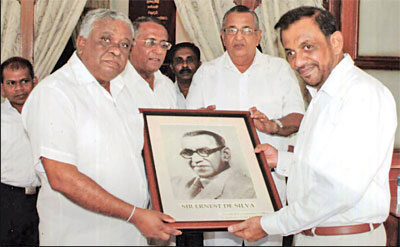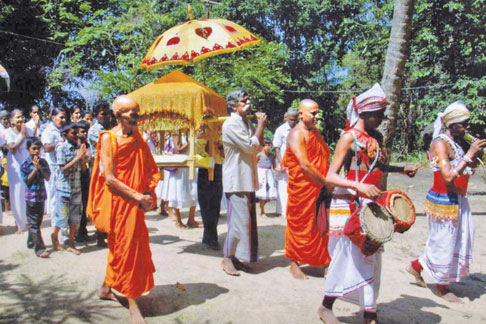|
Buddhist Spectrum
Colombo YMBA tributes Sir Ernest
 |
|
YMBA President Suren Abeygoonasekara
hands over a framed picture of Sir Ernest de Silva to Prime
Minister’s Secretary S Amarasekara. |
Colombo YMBA commemorated late Sir Ernest de Silva’s 125th birthday
anniversary on November 27 at Srimathipaya, his ancestral residence at
Sir Ernest de Silva Mawatha (Flower Road), Colombo 7, where Prime
Minister’s office is currently located.
Sir Ernest, YMBA’s second president, was the first chairman of Bank
of Ceylon and the first governor of State Mortgage and Investment Bank.
He was the most prominent philanthropist who bestowed his enormous
wealth to propagate Buddhism. His wealth was also spent on schools all
over the island that needed assistance but neglected by colonial
governments. The commemoration ceremony commenced with Ven Kotugoda
Dhammavasa Nayaka Thera’s sermon.
The large gathering included Sir Ernest’s relatives, YMBA president
Suren Abeyagoonasekera, Prime Minister’s Secretary S Amarasekara, former
BoC Chairman Dr Gamini Wickramasinghe and the representatives of State
Mortgage and Investment Bank. Sanghika dana was offered to maha sangha
from Gangarama headed by Ven Galaboda Gnanissara Nayaka Thera and Ven
Tirikunamale Ananda Anunayaka Thera from Vajiraramaya.
Suren Heads YMBA
Suren Abeyagoonasekera was re-elected at the 114th Annual General
Meeting of the Colombo YMBA (Young Mens Buddhist Association) held
recently at the Main Hall, Borella.
Abeyagoonasekera, thanking the General membership, said, “We
completed last year enhancing all our activities, by strengthening our
Branches, with greater emphasis on our main objectives. We could also
introduce new activities; launch new affiliated YMBA's, aiming at
regional developments.
The Vice Presidents re-elected were Tilak de Zoysa, Raja Kuruppu, M
Ariyaratna, Kusumabandu Samarawickrema and Mahesh Mallawaarachchi.
Sumedha Amarasinghe and Prashantha Abeykoon were re-elected as General
Secretary and Treasurer.
Five hindrances that disturb the mind
Dr Senarath Tennakoon
In the Madhupindika Sutta the Buddha's discourse analysis is a
penetrating exposition of the arising of consciousness in relation to
the sense organs in the generation of thoughts. The modus operandi in
the generation of unwholesome thoughts in the presence of mental
defilements too has been explained in a lucid manner.
 Mental consciousness (mano-vinnanaya) has the mind (manas) as its
basis and a mental object, ie an idea or a thought (dhamma) as its
object. So consciousness is connected with other faculties. Thus like
sensation, perception and volition, consciousness also is of six kinds
in relation to the six internal faculties and corresponding six external
objects (Rahula, 1959). The mind in its natural state is intrinsically
luminous (citta-prakrti-prabaswara), free from all attachments and
conceptualizing, and thus is empty in nature (sunya). The Mulapariyaya
Sutta provides a clear account of how states of consciousness originate
(Web, 2001). Feeling (vedana), sense impressions/images or ideas and
concepts (sanna), conative activities and their consequences (sankara)
and intellectual activity (vinnana) are the four mental factors which
are also the components of the mind. Mental consciousness (mano-vinnanaya) has the mind (manas) as its
basis and a mental object, ie an idea or a thought (dhamma) as its
object. So consciousness is connected with other faculties. Thus like
sensation, perception and volition, consciousness also is of six kinds
in relation to the six internal faculties and corresponding six external
objects (Rahula, 1959). The mind in its natural state is intrinsically
luminous (citta-prakrti-prabaswara), free from all attachments and
conceptualizing, and thus is empty in nature (sunya). The Mulapariyaya
Sutta provides a clear account of how states of consciousness originate
(Web, 2001). Feeling (vedana), sense impressions/images or ideas and
concepts (sanna), conative activities and their consequences (sankara)
and intellectual activity (vinnana) are the four mental factors which
are also the components of the mind.
The primary defilements of the mind which weaken intuitive insight
(cetaso upakkilese pannaya dubbali-karaye) are passion and various forms
of greed, ill-will, sloth and torpor, excitement and perplexity and
doubt. It is these and other more subtle defilements are got rid of,
that the mind becomes relatively perfect and pure (citta parisudde
pariyodata) and acquires its extrasensory powers of perception and
activity. It is the culmination of this process which results in the
attainment of Nibbana (Jayatillake, 1971).
Cultivating faith
In the Dhammapada under the section ‘The Bhikku’ (Bhikku Vagga) one
stanza highlights the importance of doing away with the five hindrances
for attaining Nibbana thus: Pancha chinde pancha jahe-pancha vutarri
bavaye, pancha sangantiko bhikku-o: gatinnani vuchchati (Cut off five,
cast off five away. Cultivate the greater five. The monk then passes the
five fetters and crosses the flood). In this stanza the five hindrances
and the five of the fetters are mentioned which should be eliminated by
cultivating faith mindfulness, effort, wisdom and concentration of the
mind. (The greater five).
The flood refers to Samsara. In the stanza no 369 the Buddha quite
metaphorically advises the Bhikkus to empty the ship (rid yourself of
bad thoughts connected with greed and hatred). To hinder is to obstruct
or delay or get in the way of achieving an object. One would say “you
are more of a hindrance than a help in my work” when one is annoyed of
another's intrusions. In Buddhism the five hindrances hinder the
devotee's effort towards the achievement of Nibbana during ones passage
through Samsara. The English equivalent terms for the Pali terms may not
offer a comprehensive coverage in interpretation.
The five hindrances (nivarana) are: lustful desires/sensual
desires/passions/ (kamacchanda), ill-will/hatred/anger (vyapada), torp
and languor/sloth and torpor (thinna/midda), restlessness and
worry/excitement and perplexity (uddaccha-kukkucca) and skeptical
doubt/neurotic doubt/doubt (vicikicha) respectively. These five are
considered as hindrances to any kind of clear understanding, as a matter
of fact to any kind of progress. When one is overpowered by them and
when one does not know how to get rid of them, then one cannot
understand right and wrong or good and bad (Rahula, 1959).
Kamacchanda refers to lustful desires or lust.... Kama is love or
desire particularly of a sexual nature. While it is the quality that
characterizes the lowest of the three, known as the Desire Relam
(kamadhatu), it is a great obstacle on the path to enlightenment
(bodhi). It is the first among the hindrances (nivarana) and the
outflows (asravas). Outflows are the group of three impurities or
defilements which are the cause of repeated rebirth. The three are
sense-desires (kamasava), the desire for continued existence (bhvasava)
and wrong views (dittasava). Chanda refers to desire, intention,
motivation. It is a psychological faculty that motivates action.
Sensual pleasures
For example lust arises through unwise thinking on the agreeable and
the delightful. Great lust tarnishes the mind as it gets immersed in
enjoying sexual pleasure thus becoming involved in evil practices
motivated by sensual desires. The mind breeds low and impure thoughts
and the subject is unable observe reality with a pure and open mind. It
may be suppressed by following six methods: fixing the mind upon an idea
that arouses disgust; contemplation on the loathsomeness of the body;
controlling one's six senses; moderation in eating; friendship with wise
and good people; right instruction. Lust and anger are permanently
extinguished upon attainment of anagamiship; restlessness is
extinguished by reaching arahantship; mental worry by reaching
stream-entry (Nyanitiloka, 1981).
2. Vyapada (ill-will/hatred). Hatred is strong dislike for someone or
some object. A person in a state of anger towards another often devises
ways and means of taking revenge from the enemy. Enemity between two
communities may lead to civil wars and criminal activities. The proverb
says that wounds may heal, but not those made by ill-words. Even though
kamachcanda, hatred situations may occur.
The antidote for ill-will is to fill the mind with wholesome thoughts
like compassion (avyapada – chetana) renunciation (nekkamma) and
non-violence (ahimsa). Considering the grave consequences; developing
skillful counterparts; allowing the unskillful mental states to just
pass by giving no attention to it and refusing or suppressing the
unskillful mental states are some methods of managing ill-will or hatred
(Wijetunge, 2001). Forgiveness is the noblest revenge.
Thinnamiddha (torpor and languor). An idle mind is the devil's
workshop. A lazy mind and a lazy body act as great impediments to ones
progress and development. Languor can be body weakness produced by hard
physical work or it can be low spirits produced by sorrow or an unhappy
love affair, lack of life or movement; stillness or heaviness like the
languor of a summer day (Hornby, 1974). In the Dhammapada the second
chapter on Vigilance (appamada vagga) presents a rich discourse on
vigilance.
Right effort
Verse number 24 states that whosoever is energetic, mindful, pure in
conduct, discriminating, self restrained, right living, and vigilant,
his fame readily increases (Rahula, 1959). The last stanza in this
section observes that the monk who is delighting in vigilance and seeing
fear in negligence will not decline as he is in Nibbana's vicinity. In
the Noble Eightfold Path, there is emphasis on Right Effort (samma
vayama) which includes the effort to avoid arising of demeritorious
states of mind; the effort to overcome demeritorious states of mind or
evil; the effort to develop good and beneficial mental states conducive
to enlightenment and the effort to maintain these good and beneficial
mental states by perseverance, energy and endeavour.
Uddhacca-kukkucca (restlessness and worry). A restless mind is unable
to remain still or quiet and is impatient. One who committed a sin is in
a state of repentance and is worried about it. He is in a disturbed
mind. Sometimes the mind would wavier between right and wrong. The
antidote for restlessness is mindfulness which is essential in
meditation practices of any kind. Right Mindfulness (sammasati) is the
seventh factor in the Noble Eightfold Path.
Vicikiccha (skeptical doubt) – A Buddhist should not breed doubts
about the three gems (the Buddha, the Dhamma and the Sangha), the Five
Precepts, the Effects of Kamma, the wholesome and unwholesome actions
(kusala-akusala kamma), the Four Noble Truths, the Noble Eightfold Path,
Rebirth and Nibbana etc. Vicikiccha is the last of the five hindrances
and is also the second of the ten fetters where it impedes the
attainment of the stage of the stream – winner (sotapanna), the first of
the stages of the Noble Path (ariya-marga). The Mara Sutta of the
Samyutta Nikaya states that the Bodhisatta had to defeat the ten gangs
of Mara (Dasa Mara Sena) which are nothing but passions and unwholesome
thoughts.
The Buddha seventh in the gang has been vicikiccha (Pemaloka, 2002).
The has always preached not to believe anything on mere hearsay,
tradition or dogma. Thus. He has given full freedom to His followers to
reason, analyse, and realize by direct insight, the Dhamma that He
propounded (Wijetunge, 2001).
 |
|
A Kathina
festival was recently held at Mayuragiri Rajamaha Vihara,
Moneragala. The devotees had to take a difficult journey to
the temple located atop a mountain. The picture shows the
devotees climbing the mountain with alms. Pictures by
Bandula Alahakone |
|







